高中英语知识讲解 直接引语和间接引语(Ⅰ)
高一英语直接引语和间接引语
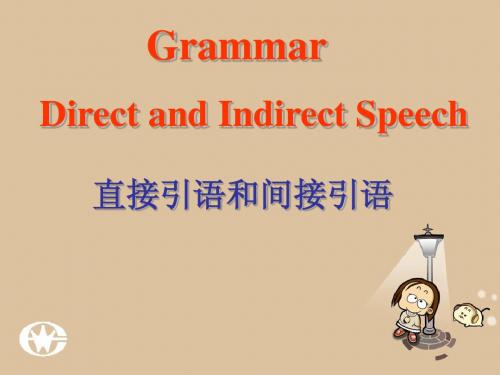
选择疑问句 •用whether…or…表达,而不用if…or…,也 不用either…or… • He asked, “Do you speak English or French?” • He asked me whether I spoke English or French. • I asked, “Will you take a bus or take a train?” • I asked him whether he would take a bus or take a train.
在直接引语变为间接引语时需要注意的变化 1. 注意时态的变化 2. 注意人称变化。
3. 注意指示代词的变化
4. 注意时间的变化 5. 注意地点的变化 6. 注意个别趋向动词的变化
直接引语
间接引语
指示代词
时 间 状 语
this, these that, those now, today then, that day this week that week yesterday the day before last week the week before four days ago four days before yesterday the day before the day before two days before yesterday the next day tomorrow the next month next month
4. “Why were you late again?” The teacher said to me. The teacher asked me why I was late again. 5. “I don’t like swimming,” said Sarah. Sarah said she didn’t like swimming. 6. His friends asked him if he would go to Dalian. His friends asked him, “Will you go to Dalian?” 7. “Have you been to Paris?” My classmate asked me. My classmate asked me if I had been to Paris.
高中英语直接引语和间接引语讲解
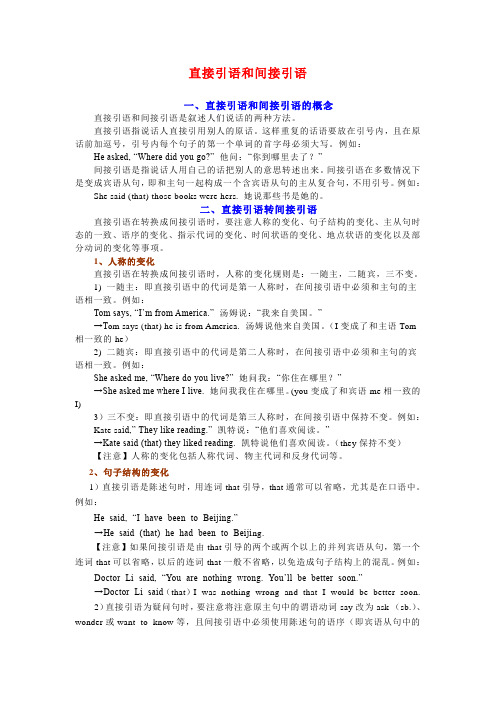
直接引语和间接引语一、直接引语和间接引语的概念直接引语和间接引语是叙述人们说话的两种方法。
直接引语指说话人直接引用别人的原话。
这样重复的话语要放在引号内,且在原话前加逗号,引号内每个句子的第一个单词的首字母必须大写。
例如:He asked, “Where did you go?” 他问:“你到哪里去了?”间接引语是指说话人用自己的话把别人的意思转述出来。
间接引语在多数情况下是变成宾语从句,即和主句一起构成一个含宾语从句的主从复合句,不用引号。
例如:She said (that) those books were hers. 她说那些书是她的。
二、直接引语转间接引语直接引语在转换成间接引语时,要注意人称的变化、句子结构的变化、主从句时态的一致、语序的变化、指示代词的变化、时间状语的变化、地点状语的变化以及部分动词的变化等事项。
1、人称的变化直接引语在转换成间接引语时,人称的变化规则是:一随主,二随宾,三不变。
1) 一随主:即直接引语中的代词是第一人称时,在间接引语中必须和主句的主语相一致。
例如:Tom says, “I’m from America.” 汤姆说:“我来自美国。
”→T om says (that) he is from America. 汤姆说他来自美国。
(I变成了和主语Tom 相一致的he)2) 二随宾:即直接引语中的代词是第二人称时,在间接引语中必须和主句的宾语相一致。
例如:She asked me, “Where do you live?” 她问我:“你住在哪里?”→She asked me where I live. 她问我我住在哪里。
(you变成了和宾语me相一致的I)3)三不变:即直接引语中的代词是第三人称时,在间接引语中保持不变。
例如:Kate sa id,” They like reading.” 凯特说:“他们喜欢阅读。
”→Kate said (that) they liked reading. 凯特说他们喜欢阅读。
高二英语直接引语与间接引语知识精讲

• (2)Tom told me , “ I am playing computer games now . ”
• 汤姆告诉我,“我现在正在打电子游戏。”
• Tom told me that he was playing computer games then .
他告诉我他把他的书落在了我的房间。
• She said , “ He will be busy . ” • 她说,“他将很忙。” • She said that he would be busy . 她说他将很忙。
• 2. 时态变化:如果主句的谓语动词是一般过 去时,若将直接引语变成间接引语,时态则 有如下变化。
• 汤姆告诉我他那时正在打电子游戏。
; 苹果售后维内容尖刻的信回敬那家伙。 “可以狠狠地骂他一顿。”林肯说。 斯坦顿立刻写了一封措辞强烈的信,然后拿给总统看。 “对了,对了。”林肯高声叫好,“要的就是这个!好好训他一顿,真写绝了,斯坦顿。” 但是当斯坦顿把信叠好装进信封里时,林肯却 叫住他,问道:“你要干什么?” “寄出去呀。”斯坦顿有些摸不着头脑了。 “不要胡闹。”林肯大声说,“这封信不能发,快把它扔到炉子里去。凡是生气时写的信,我都是这么处理的。这封信写得好,写的时候你己经解了气,现在感觉好多了吧,那么就请你把它烧掉,再 写第二封信吧。” 6、果断 有一个6岁的小男孩,一天在外面玩耍时,发现了一个鸟巢被风从树上吹掉在地,从里面滚出了一个嗷嗷待哺的小麻雀。小男孩决定把它带回家喂养。 当他托着鸟巢走到家门口的时候,他突然想起妈妈不允许他在家里养小动物。于是,他轻轻地把小 麻雀放在门口,急忙走进屋去请求妈妈。在他的哀求下妈妈终于破例答应
(完整)高中英语直接引语和间接引语讲解
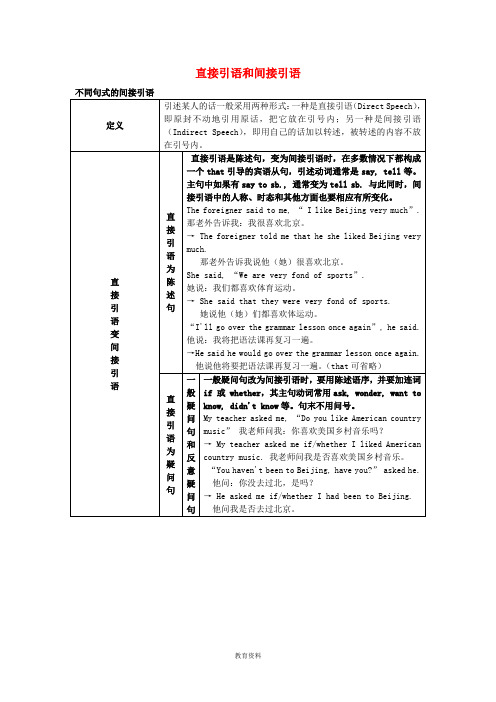
“What about having a drink?”he asked.
他问:喝杯怎么样?
He suggested having a drink. 他建议喝一杯。
②.advise sb to do
“Why don't you go hiking”, asked James.
他说:你看起来气色多好啊!
→ He said how well I looked.
他说我看起来是气色多好啊。
2.有些感叹句可以根据原句的意思,采用适当的动词变为陈述句,不需用间接宾语来转述。
“Help!”, he cried. 他喊到:救命啊!
→ He called for help. 他大声呼救。
“What a clever boy you are!”, my teacher said to him.
老师对他说,你是个聪明的孩子啊!
→ My teacher told him what a clever boy he was.
老师对他说他是一个多聪明的孩子啊。
He said,“How well you look!”.
直接引语和间接引语
不同句式的间接引语
定义
引述某人的话一般采用两种形式:一种是直接引语(Direct Speech),即原封不动地引用原话,把它放在引号内;另一种是间接引语(Indirect Speech),即用自己的话加以转述,被转述的内容不放在引号内。
直
接
引
语
变
间
接
引
语
直接引语为陈述句
直接引语是陈述句,变为间接引语时,在多数情况下都构成一个that引导的宾语从句,引述动词通常是say, tell等。主句中如果有say to sb., 通常变为tell sb. 与此同时,间接引语中的人称、时态和其他方面也要相应有所变化。
英语中的直接引语和间接引语

英语中的直接引语和间接引语一、直接引语和间接引语的概念1. 直接引语- 直接引语就是直接引用别人的原话,被引用的部分通常放在引号内。
例如:He said, "I am going to the park." 在这个句子中,“I am going to the park.”就是直接引语,它原封不动地呈现了说话者所说的内容。
2. 间接引语- 间接引语是用自己的话转述别人的话,不用引号。
例如:He said that he was going to the park. 这里“he was going to the park”就是间接引语,它是对原句“He said, 'I am going to the park.'”的转述。
二、直接引语变间接引语的变化规则1. 人称的变化- 如果直接引语中的主语是第一人称(I或we),在变为间接引语时,要根据句子的意思相应地变为第三人称(he/she或they)。
- 例如:- 直接引语:I said, "I like this book."- 间接引语:I said that I liked this book.(这里因为主语都是I,人称不变,但如果是He said, "I like this book." 变为间接引语就是He said that he liked this book.)- 如果直接引语中的第二人称(you),在变为间接引语时,要根据转述者和听话者的关系变为第一人称(I/we)或第三人称(he/she/they)。
- 例如:- 直接引语:He said to me, "You are a good student."- 间接引语:He told me that I was a good student.- 直接引语:He said to her, "You should study hard."- 间接引语:He told her that she should study hard.2. 时态的变化- 一般现在时变为一般过去时。
高中英语-直接引语和间接引语

一、直接引语直接引用别人的原话叫做直接引语,直接引语通常置于引号内(“引用原话”)。
—“What is it all about?”—“究竟是什么事呢?”—“Nothing serious, just a storm in a teacup.”—“没有什么,大惊小怪而已。
”二、间接引语用自己的话转述别人的意思,或引用自己说过的话,都叫做间接引语。
间接引语多数用宾语从句来表达。
Mary said that she received a sugar report this morning.玛莉说她今天早上收到了一封情书。
He said that his hands were quite full at that moment.他说那时他忙得不可开交。
三、直接引语与间接引语的转换在将直接引语转换为间接引语时,不仅句式上要有变化,而且要在时态、人称、时间、地点等方面作相应的变化。
1、引语转换时的句式变化不同的直接引语句式,如:陈述句、疑问句、祈使句和感叹句,转换成间接引语时要遵循一定的句式转换规则,还要注意根据句意,使用适当的引述动词。
(1)陈述句的间接引语将陈述句转换为间接引语,通常用that引导的宾语从句来表达。
连词that 在不引起歧义的情况下可以省略。
引述分句的动词常见的有say 和tell等。
He said, “I caught a cold yesterday.”他说:“我昨天感冒了。
”He said (that) he had caught a cold the day before.他说他前天感冒了。
Helen said to me, “I’m tired of taking such exams.”海伦说:“我讨厌参加这种考试。
”Helen told me (that) she was tired of taking such exams.海伦说她讨厌参加这种考试。
在下列情况下,往往要保留that。
高中英语必修1:Unit 1 直接引语和间接引语

Unit one FriendshipDirect speech and indirect speech(直接引语和间接引语)一.基本概念I直接引语变为间接引语1)、直接引语为陈述句2)、直接引语为祈使句3)、直接引语为疑问句4)、直接引语为感叹句II1、直接引语和间接引语都属于宾语从句2、直接引语和间接引语的概念(1)直接引语:一字不改地引述别人的话(2)间接引语:用说话人自己的话转述别人的话二.变换类型1.直接引语为陈述句直接引语为陈述句,用that引导(口语中可以省略)。
引述动词有:say, tell等。
陈述句变间接引语要注意:1、人称的变化2、指示代词、时间状语、地点状语和动词的变化3、时态的变化4、人称的变化。
一般的规则:一随主,二随宾,三不变例如:The teacher said, “John, you must bring your book to the class. ”1> 第三者说:The teacher told John that he must bring his book to the class.2> 别人对约翰说:The teacher said that you must bring your book to the class.3> 约翰自己说:The teacher said that I must bring my book to the class.I指示代词、时间状语、地点状语和动词的变化1〉指示代词的变化this---- that these----those2〉时间状语的变化now---- then ago---- before today----that day yesterday----the day before; theprevious day tomorrow----the next day; the following day the day beforeyesterday----two days before the day after tomorrow----two days later nextweek/month, etc.----the next week/month, etc. last week/month, etc.----theweek/month before3〉地点状语的变化here----there4〉动词的变化come----go注:在当地转述时,here不变为there,come不变为go.在当天转述时,yesterday, tomorrow等时间状语也不变。
高一英语必修一语法知识点
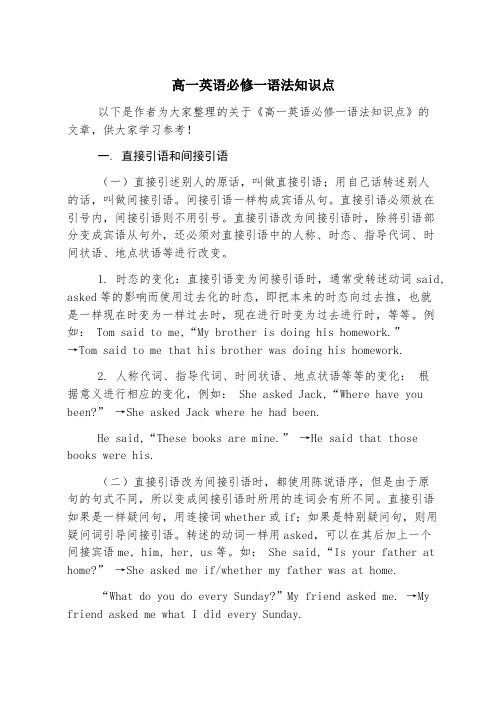
高一英语必修一语法知识点以下是作者为大家整理的关于《高一英语必修一语法知识点》的文章,供大家学习参考!一. 直接引语和间接引语(一)直接引述别人的原话,叫做直接引语;用自己话转述别人的话,叫做间接引语。
间接引语一样构成宾语从句。
直接引语必须放在引号内,间接引语则不用引号。
直接引语改为间接引语时,除将引语部分变成宾语从句外,还必须对直接引语中的人称、时态、指导代词、时间状语、地点状语等进行改变。
1. 时态的变化:直接引语变为间接引语时,通常受转述动词said, asked等的影响而使用过去化的时态,即把本来的时态向过去推,也就是一样现在时变为一样过去时,现在进行时变为过去进行时,等等。
例如:Tom said to me,“My brother is doing his homework.”→Tom said to me that his brother was doing his homework.2. 人称代词、指导代词、时间状语、地点状语等等的变化:根据意义进行相应的变化,例如: S he asked Jack,“Where have you been?” →She asked Jack where he had been.He said,“These books are mine.” →He said that those books were his.(二)直接引语改为间接引语时,都使用陈说语序,但是由于原句的句式不同,所以变成间接引语时所用的连词会有所不同。
直接引语如果是一样疑问句,用连接词whether或if;如果是特别疑问句,则用疑问词引导间接引语。
转述的动词一样用asked,可以在其后加上一个间接宾语me, him, her, us等。
如:She said,“Is your father at home?” →She asked me if/whether my father was at home.“What do you do every Sunday?”My friend asked me. →My friend asked me what I did every Sunday.直接引语如果是祈使句,改为间接引语时,要将祈使句的动词原形变为带to的不定式,并在不定式的前面根据原句的语气(即要求或命令)加上ask, tell, order等动词,如果祈使句为否定式,则在不定式前加not。
直接引语和间接引语语法讲解

直接引语和间接引语Name ____________ No._________一、直接引语:直接引用别人的原话。
具有以下特点:①直接引语通常置于引号内,不作任何改动。
②没有时态呼应的问题。
③引用原话前可以用逗号“,”,也可以用冒号“:”。
④第二个引号前,亦即用重述的话之末,按其类别放一个句号(.)或问号(?)等。
二、间接引语:用自己的话转述别人的意思,或引用自己说过的话。
间接引语多数用宾语从句来表达。
间接引语具有以下特点:①不要逗号,冒号,引号。
②要考虑人称的变化(人称的变化与汉语是一样的)。
③要考虑时态的变化。
④要考虑时间状语的变化,地点状语的变化和指示代词的变化。
三、直接引语与间接引语的转换。
㈠转述陈述句或感叹句,去冒号和引号连词用that (that,无词意,不作成分,口语中可省))接宾语从句,,从句中要作人称、时态等相应的变化(时态为“主现从实,主过从相过”;人称/物主/反身等代词:引号内的第一人称改为与主句的主语相同的人称;第二人称改为第一人称;第三人称不变。
)。
例如:"You speak English very well." She said.她说,“你英语讲得不错”。
She said that I spoke English very well.她说我英语讲得不错。
㈡转述一般疑问句,去冒号和引号。
连词用if/whether(有词意"是否",不作成分,不可省)接宾语从句,其后改用陈述句语序。
从句中要作人称、时态等相应的变化。
注意:①当助动词为do/does/did时,改为宾语从句时应去掉,而在谓语动词上体现时态,但如为don't/doesn't/didn't时,则不能去掉。
②当连词为if/whether时,其前谓语动词say/says/said →ask/asks/asked,say/says/said to sb→ask/asks/asked sb例如:He said,"do you have a knife?"→He asked if/whether I had a knife.He asked ,"Have you ever been to the Great Wall?"他问,"你去过长城吗?"He asked (me) if /whether I had ever been to the Great Wall?他问我是否去过长城?㈢转述特殊疑问句,去冒号和引号。
人教版高中英语必修一直接引语和间接引语讲解

高中英语学习材料(灿若寒星*制作整理)直接引语和间接引语不同句式的间接引语定义引述某人的话一般采用两种形式:一种是直接引语(Direct Speech),即原封不动地引用原话,把它放在引号内;另一种是间接引语(Indirect Speech),即用自己的话加以转述,被转述的内容不放在引号内。
直接引语变间接引语直接引语为陈述句直接引语是陈述句,变为间接引语时,在多数情况下都构成一个that引导的宾语从句,引述动词通常是say, tell等。
主句中如果有say to sb., 通常变为tell sb. 与此同时,间接引语中的人称、时态和其他方面也要相应有所变化。
The foreigner said to me, “ I like Beijing very much”.那老外告诉我:我很喜欢北京。
→The foreigner told me that he she liked Beijing very much.那老外告诉我说他(她)很喜欢北京。
She said, “We are very fond of sports”.她说:我们都喜欢体育运动。
→She said that they were very fond of sports.她说他(她)们都喜欢体运动。
“I'll go over the grammar lesson once again”, he said.他说:我将把语法课再复习一遍。
→He said he would go over the grammar lesson once again.他说他将要把语法课再复习一遍。
(that可省略)直接引语为疑问句一般疑问句和反意疑问句一般疑问句改为间接引语时,要用陈述语序,并要加连词if 或whether,其主句动词常用ask, wonder, want toknow, didn't know等。
句末不用问号。
My teacher asked me, “Do you like American country music”我老师问我:你喜欢美国乡村音乐吗?→My teacher asked me if/whether I liked American countrymusic. 我老师问我是否喜欢美国乡村音乐。
英语直接引语和间接引语用法讲解

英语直接引语和间接引语用法讲解引言:英语语法中,直接引语和间接引语是两种常见的引述方式。
在交流和写作中,正确使用直接引语和间接引语能够增加表达的准确性和可读性。
本文将详细介绍直接引语和间接引语的用法,帮助读者更好地理解和运用这两种引述方式。
一、直接引语直接引语是指直接引述他人的原话或句子,通常使用引号包裹,并在引用的句子前后使用逗号或其他标点符号进行标示。
下面是一些直接引语的例子:1. She said, "I am going to the park."2. "Can you help me with my homework?" he asked.3. "It's a beautiful day," they exclaimed happily.需要注意的是,在直接引语中,引述的内容要保持原文的准确性,不得有意省略或更改原话,同时引号的使用要准确,避免引起误解。
二、间接引语间接引语是指通过自己的话来转述他人的原话或句子,不使用引号,而是采用陈述句的语法结构。
在间接引语中,还需要注意变换动词时态和人称。
下面是一些间接引语的例子:1. She told me that she was going to the park.2. He asked if I could help him with his homework.3. They said happily that it was a beautiful day.在转述他人的原话时,要准确地传递原文的意思,避免产生歧义和误解。
此外,在使用间接引语时,还要注意一下几点:1. 当直接引语中有时态或人称变化时,需要将其调整为合适的变化形式。
例如,“I am going” 转述为“she was going”,“Can you help me?” 转述为“he asked if I could help him”。
人教版高中英语必修一知识点整理

~1. 语法:直接引语和间接引语(1)陈述句和疑问句friendship2.阅读及语言点:a.Anne’s best friend3.写作:建议信4.巩固练习Period2: language pointsPeriod3: using languagePeriod4:writingPeriod5:quiz语法直接引语和间接引语1. 直接引语在改为间接引语时,时态需要做相应的调整。
eg: “I broke your CD player.” (一般过去时改成过去完成时)He told me he had broken my CD player.Jenny said, “I have lost a book.”(现在完成时改成过去完成时)Jenny said she had lost a book.Mum said, “I’ll go to see a friend.”(一般将来时改成过去将来时)Mum said she would go to see a friend.过去完成时保留原有的时态He said, “We hadn’t finished our homework.”He said they hadn’t finished their homework.注意直接引语是客观真理,过去进行时,时态不变。
2.在直接引语变间接引语时,如果从句中的主语时第一人称或被第一人称所修饰,从句中的人称要按照主句中主语的人称变化。
如:Mary said, “My brother is an engineer.”Mary said her brother was and engineer.3.直接引语如果是反意疑问句,选择疑问句或一般疑问句,间接引语应改为由whether或if引导的宾语从句。
如:He said, “Can you run, Mike?”He asked Mike whether/if he could run.4. 直接引语如果是祈使句,间接引语应改为“tell(ask, order, beg等) * (not) to do sth.”句型。
高中英语直接引语和间接引语用法讲解

高中英语直接引语和间接引语用法讲解一、概述引用或转述别人说的话时有两种方法:直接引述别人的原话,这叫做直接引语(direct speech)。
用自己的话转述别人的话,叫间接引语(indirect speech)。
一般地讲,直接引语前后要加引号,间接引语不用引号,而用宾语从句来表达。
Mr. Black said, “I'm busy.”布菜克先生说:“我很忙”。
(直接引语)Mr. Black said that he was busy .布菜克先生说他很忙。
(宾语从句是间接引语)从上例看来,直接引语改为间接引语时,除将直接引语改为宾语从句之外,还须对直接引语中的人称和时态进行相应的变化,如上例直接引语中的I 改成了he, am 则改成了was 。
现将由直接引语改为间接引语时应注意的问题,分述如下:二、直接引语是陈述句时直接引语如果是陈述句,变为间接引语时,用连词that 引导(that 在口语中常省去),that 从句之前用say 、tell 等动词,从句中的人称、时态、指示代词、时间状语、地点状语等要作相应的变化。
1、 人称的变化直接引语改为间接引语人称要相应的变化,把直接引语中的第一人称(如:I ,me ,my ,mine ,we ,us ,our ,ours)变为与主句的主语相一致的人称。
把直接引语中的第二人称(you ,your ,yours)变为和主句的间接宾语(即听话人,如无听话人,可根据上下文的体会人为确定一个人称)相一致的人称。
直接引语中的第三人称(he ,him ,his ,she ,her ,hers,it ,its,they,their ,theirs ,them)变为间接引语时,人称不变。
He said , “I like it very much.” 他说:“我非常喜欢它”。
→He said that he liked it very much. 他说他非常喜欢它。
英语直接引语和间接引语

英语直接引语和间接引语1. 直接引语定义:直接引用原话,把它放在引号内,不需要改变句子结构中的时态或代词。
如下:They said, “We watched a movie last night.”他们说,“我们昨晚看了一部电影。
”2. 间接引语定义:用自己的话加以转述,被转述的内容不放在引号内。
间接引语大都是宾语从句,当直接引语为陈述句或者疑问句被转换成间接引语时,句子的结构,人称,时态,时间状语和地点状语等都要发生改变。
如下:Tom said, “I am so hungry.” (direct speech)汤姆说:“我太饿了。
”(直接引语)Tom said that he was so hungry. (indirect speech)汤姆说他太饿了。
(间接引语)在间接引语中我们可以发现人称I变成了he,动词am变成了was。
那么我们就来具体看看由直接引语变为间接引语时,我们的人称和时态如何变化:如何变人称:有一句顺口溜“一随主;二随宾;第三人称不更新”。
“一随主”是指在直接引语变间接引语时,如果从句中的主语是第一人称,从句中的人称要按照主句中主语的人称变化,如:She said, "My brother wants to go with me. "→She said her brother wanted to go with her.“二随宾”是指直接引语变间接引语时,若从句中的主语及宾语是第二人称。
从句中的人称要跟引号外的主句的宾语一致。
如:He said to Kate, "How is your sister now?"→He asked Kate how her sister was then。
“第三人称不更新”是指直接引语变间接引语时。
如果从句中的主语及宾语是第三人称,从句中的人称一般不需要变化。
如:Mr. Smith said, "Jack is a good worker。
高二英语直接引语和间接引语知识精讲(1)
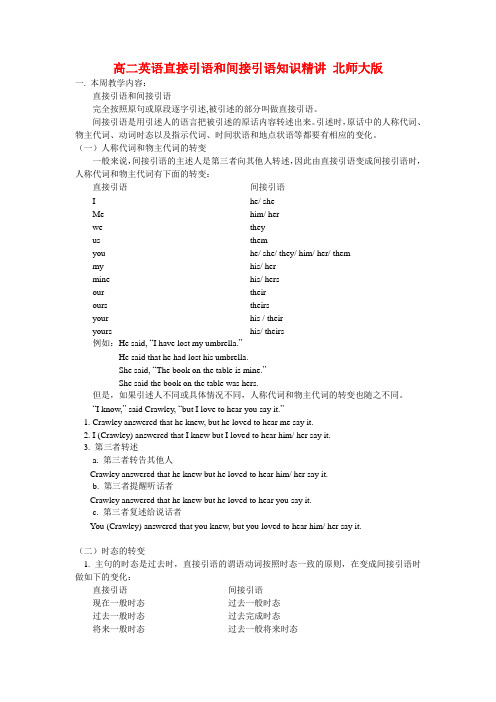
高二英语直接引语和间接引语知识精讲北师大版一. 本周教学内容:直接引语和间接引语完全按照原句或原段逐字引述,被引述的部分叫做直接引语。
间接引语是用引述人的语言把被引述的原话内容转述出来。
引述时,原话中的人称代词、物主代词、动词时态以及指示代词、时间状语和地点状语等都要有相应的变化。
(一)人称代词和物主代词的转变一般来说,间接引语的主述人是第三者向其他人转述,因此由直接引语变成间接引语时,人称代词和物主代词有下面的转变:直接引语间接引语I he/ sheMe him/ herwe theyus themyou he/ she/ they/ him/ her/ themmy his/ hermine his/ hersour theirours theirsyour his / theiryours his/ theirs例如:He said, “I have lost my umbrella.”He said that he had lost his umbrella.She said, “The book on the table is mine.”She said the book on the table was hers.但是,如果引述人不同或具体情况不同,人称代词和物主代词的转变也随之不同。
“I know,” said Crawley, “but I love to hear you say it.”1. Crawley answered that he knew, but he loved to hear me say it.2. I (Crawley) answered that I knew but I loved to hear him/ her say it.3. 第三者转述a. 第三者转告其他人Crawley answered that he knew but he loved to hear him/ her say it.b. 第三者提醒听话者Crawley answered that he knew but he loved to hear you say it.c. 第三者复述给说话者You (Crawley) answered that you knew, but you loved to hear him/ her say it.(二)时态的转变1. 主句的时态是过去时,直接引语的谓语动词按照时态一致的原则,在变成间接引语时做如下的变化:直接引语间接引语现在一般时态过去一般时态过去一般时态过去完成时态将来一般时态过去一般将来时态现在进行时态过去进行时态过去进行时态过去完成进行时态将来进行时态过去将来进行时态现在完成时态过去完成时态过去完成时态过去完成时态将来完成时态过去将来完成时态现在完成进行时态过去完成进行时态过去完成进行时态过去完成进行时态将来完成进行时态过去将来完成进行时态例如“I am afraid that arguments don’t make a difference..”said he with a smile.He said with a smile that he was afraid that arguments didn’t make a difference.So he said to me, “You don’t know what you are talking about.”So he said to me I didn’t know what I was talking about.“I did not suppose that you had done it on purpose.” she said.She said that she had not supposed that he had done it on purpose.“I have won the match already.” claimed my friend.My friend claimed that he had won the match already.I said,“I shall be there.”I said I should be there.2. 主句谓语动词虽然是过去时,但在下面情况中间接引语的谓语动词时态不变。
英语直接引语与间接引语

英语直接引语与间接引语直接引语和间接引语是英语中常见的引述他人说话或思想的方式。
在书写中,我们需要了解如何正确地使用和引用直接引语和间接引语。
以下是关于英语直接引语和间接引语的详细介绍。
一、直接引语直接引语是将原话使用引号直接援引出来并照原样呈现的方式。
在引用直接引语时,需要使用适当的标点符号、引号和动词。
例如:1. 她说:“我很喜欢这本书。
”2. “你什么时候回来?”他问道。
3. “我会帮助你的。
”他向我保证道。
在直接引语中,引号需要紧贴引文,句号或其他标点符号则放在引号之内。
动词通常在引语之后的逗号或冒号之前使用。
需要注意的是,当某人的原话跨越多个段落时,只需要在首次引用时使用引号,其他段落之前不再使用引号。
二、间接引语间接引语是通过转述或改写原话的方式来引述他人的说话或思想。
在间接引语中,不需要使用引号,而是通过动词的变化来呈现原话。
例如:1. 她说她很喜欢那本书。
2. 他问我什么时候回来。
3. 他向我保证会帮助我。
在使用间接引语时,需要将原话改写成陈述句,并修改人称和动词的时态,以适应引述者的身份。
对于引述他人的提问,需要将原问句改写成陈述句。
需要注意的是,间接引语中不需要使用句号或其他标点符号。
三、引用动词在使用直接引语或间接引语时,我们需要使用适当的引用动词。
以下是常见的引用动词:1. 说(said)例如:“我很喜欢这本书。
”她说道。
2. 问(asked)例如:“你什么时候回来?”他问道。
3. 回答(answered)例如:“我会帮助你的。
”他回答道。
4. 告诉(told)例如:“明天会下雨。
”他告诉我。
5. 表示(expressed)例如:“我对这个决定感到满意。
”她表示。
需要根据具体情境选择合适的引用动词,并根据时态和人称进行变化。
总结:英语直接引语和间接引语是引述他人说话或思想的两种常见方式。
在使用直接引语时,需要使用引号和适当的标点符号,并在引语之后使用适当的动词。
而在使用间接引语时,需要将原话改写成陈述句,并通过动词的变化来呈现原话。
【高一同步教程】高中英语必修1 Unit1语法:直接引语和间接引语(1)讲解及练习

高中英语必修1 Unit 1语法教学案Section_ⅢGrammar —直接引语和间接引语(Ⅰ)语法图解【探究发现】1.“I don’t want to set down a series of facts in a diary,” said Anne.→Anne said that she didn’t want to set down a series of facts in a diary.2.“Does a friend always have to be a person?” the writer asks us.→The writer asks us if a friend always has to be a person.3.“What do you call your diary?” Anne’s sister asked her.→Anne’s sister asked her what she called her diary.4.“Why did you go to bed so late last night?” Father asked Anne.→Father asked Anne why she had gone to bed so late the night before.5.The teacher said to the students, “Water freezes when the temperature falls below 0℃.”→The teacher told the students that water freezes when the temperature falls below 0℃.6.“What did Edison do to help the doctor operate on his mother?” the teacher asked us.→The teacher asked us what Edison had done to help the doctor operate on his mother.【我的发现】(1) 在直接引语变为间接引语的过程中,从句的主语常常按照一定的规律发生变化,从句的主语作适当改变,从句中的时态往往有一定改变,如句1;但陈述客观事实时时态不变,如句5。
高二英语直接引语与间接引语知识精讲

• (2)Tom told me , “ I am playing computer games now . ”
• 汤姆告诉我,“我现在正在打电子游戏。” • Tom told me that he was playing computer
games then . • 汤姆告诉我他那时正在打电子游戏。
• 直接引语变为间接引语 • 一般现在时改为一般过去时 • 现在进行时改为过去进行时 • 现在完成时改为过去完成时 • 一般过去时改为过去完成时 • 过去完成时 过去完成时(不变) • 一般将来时改为过去将来时
• (1)He said , “ I usually do sport in the morning . ” • 他说,“我经常在早晨锻炼身体。” • He said that he usually did sport in the morning .
• 杰克对我们说,“一个外国访问团将来我 校参观。”
• Jack told us that a group of foreigners would visit our school .
• 杰克告诉我们一个外国访问团将来我校参 观。
• 3. 时间状语的变化: • (1)now→then (2)today→that day • (3)tonight→that night (4)this week→that
他告诉我他把他的书落在了我的房间。
• She said , “ He will be busy . ” • 她说,“他将很忙。” • She said that he would be busy . 她说他将很忙。
• 2. 时态变化:如果主句的谓语动词是一般过 去时,若将直接引语变成间erday→the day before (6)yesterday
- 1、下载文档前请自行甄别文档内容的完整性,平台不提供额外的编辑、内容补充、找答案等附加服务。
- 2、"仅部分预览"的文档,不可在线预览部分如存在完整性等问题,可反馈申请退款(可完整预览的文档不适用该条件!)。
- 3、如文档侵犯您的权益,请联系客服反馈,我们会尽快为您处理(人工客服工作时间:9:00-18:30)。
直接引语和间接引语概念引入:我们先看下面的句子:1.John said, “I’m going to London with my father.”约翰说:“我要和父亲到伦敦去。
”2.She said, “Do you often e here to read newspapers?”她说:“你经常来这儿看报吗?”3.I asked him, “Will you stay at home or go to a film tonight?”我问他:“你今晚是待在家还是去看电影?”4.“Why don’t you take a walk after supper?” he asked.他问:“饭后干嘛不出去走走呢?”从上述四个例句看出:引内是直接引用别人的原话,这种句子为直接引语。
再看这一组句子:1.John said that he was going to London with his father.约翰说,他要和他父亲去伦敦。
2.She asked me if (whether) I often went there to read newspapers.她问我是否经常去那儿看报。
3.I asked him whether he would stay at home or go to a film that night.我问他那天晚上是待在家还是去看电影。
4.He advised me to take a walk after supper.他建议我晚饭后出去走走。
从第二组的四个例句看出,都是别人的原话进行了转述,这就是间接引语。
在转述中,人称、时态、代词、时间状语的表达都有所变化。
那么从直接引语变成间接引语,都有哪些部分需要变化呢?用法讲解【高清课堂:直接引语和间接引语P1】,课文原句回放首先请看下面几个句子,这几个句子来自课文,分别是直接引语和间接引语。
请大家看看这些句子,看看这些直接引语和间接引语有什么区别。
其实,我们从形式上就可以看出它们的区别:1. “I don’t want to set down a series of facts in a diary,” said Anne. (Direct speech)安妮说:”我不想在日记中记流水账。
”Anne said that she didn’t want to set down a series of facts in a diary. (Indirect speech) 安妮说她不想在日记中记流水账。
2. Anne’s sister asked her what she called her diary. (Indirect speech)安妮的姐姐问她怎么称呼她的日记。
“What do you call your diary?” Anne’s sister asked her. (Direct speech)安妮的姐姐问她:”你怎么称呼你的日记?”从上述例句可以看出,第一句话是引用别人的话;第二句是转述别人的话。
第三句也是转述别人的问话,第四句话是直接引用别人的问题。
由此可知,引述别人的话有两种方式。
我们看看直接引语和间接引语的定义:I. 引述别人的话有两种方式:一是使用引引出别人的原话,被引用的句子叫直接引语;一是用自己的话转述别人的话,被转述的部分叫做间接引语。
直接引语和间接引语的一个重要的判断标准是有无引,一个是引述原文,一个是转述,在转述的过程中会有一些相应的变化。
请根据定义判断下面哪些是直接引语,哪些是间接引语。
1. “I never eat meat,” he explained. (直接引语)他解释说:”我从来不吃肉。
”2. Kitty said she would wait another day. (间接引语)基蒂说她会再等一天。
3. “Who is it?” Wilson shouted. (直接引语)威尔逊喊道:”这是谁啊?”4. I objected that she was too young for the position.我表示反对,她对于这个职位来说太年轻了。
(间接引语,object意为“反对”,没有用said,但同样是引出这个人所说的话。
)5. “I presume,” he mented, “that she will learn how to do it in time.”他评价道:“我认为她会及时学会怎么做这件事的。
”(直接引语,ment意为“做出评价”。
)直接引语和间接引语在形式上是不同的,他们之间相互转换的话,有哪些方面需要变换呢?总体如下:—各种句式变换—从句时态变化—人称变化—指示代词、地点副词、少数动词和时间状语变化陈述句及人称的变化直接引语如果是陈述句,变为间接引语时,原句变为用连词that引导的宾语从句(that 在口语中常省略),从句中的人称、时态、指示代词、时间状语、地点状语等要作相应变化。
在这一方面,汉语和英语有很多相似之处,因此,在做直接引语和间接引语转换练习时,要特别注意句子的意义。
主句的引述动词主要有say, tell, repeat, explain, think等。
1. S he said, “Our train will arrive in five minutes.” 他说:“我们的火车五分钟内到。
”→She said (that) their train would arrive in five minutes. 他说他们的火车五分钟内到。
2. He said, “I’m very hungry.” 他说:“我饿了。
”→He said (that) he was very hungry. 他说他饿了。
3. He added that Jason lost money because he would not tell a lie. (2015 湖北高考)人称的变化直接引语变间接引语时人称的变化可以归纳成:一随主,二随宾,三不更新。
“一随主”是指在直接引语变间接引语时,如果从句中的主语是第一人称或被第一人称所修饰,从句中的人称要按照主句中主语的人称来变化。
She said, “My brother wants to go shopping with me.”她说:“我兄弟想跟我一起购物。
”→She said her brother wanted to go shopping with her. 她说她兄弟想跟她一起购物。
“二随宾”是指直接引语变间接引语时,若从句中的主语及宾语是第二人称或被第二人称所修饰。
从句中的人称要跟引外的主句的宾语一致。
如果引外的主句没有宾语,也可以用第一人称。
I said to him, “You’ve left your book in my room.” 我对他说:“你把书落在我的房间里”。
→I told him that he had left his book in my room. 我告诉他,他把书落在我的房间里。
“第三人称不更新”是指直接引语变间接引语时,如果从句中的主语及宾语是第三人称或被第三人称所修饰,从句中的人称一般不需要变化。
Mr. Smith said,”Jack is a good worker.”史密斯先生说:“杰克是个好工人。
”→ Mr. Smith said Jack was a good worker.史密斯先生说杰克是个好工人。
注意:一般情况下,连词that引导的宾语从句往往可以省略that,但是在下列情况下,往往要保留that。
1. that 的省略会产生歧义。
Linda said disappointedly that when she arrived at the station, the train had already left.琳达很失望地说,她到达车站时火车已经开走了。
(如省略that,when状语从句既可以理解为修饰said, 又可以理解为修饰had left。
)2. 当动词后面跟多个that引导的从句时,从第二个从句开始that不能省略。
He said (that) he was leaving for Europe the next week and that he would stay there for half a year. 他说他下周要到欧洲去,并在那里呆半年。
(第二个that不能省略)■时态的变化直接引语在改为间接引语时,时态需要做相应的调整。
1) 一般现在时→一般过去时态;Mother said, “Jack is a good boy.” 妈妈说:“杰克是个好孩子。
”→ Mother said that Jack was a good boy. 妈妈说杰克是个好孩子。
(2016 浙江高考) I said I couldn’t stand it one minute longer.(can→could)2) 现在进行时→过去进行时;She said, “I am reading a book.” 她说:“我正在看书。
”→She said she was reading a book. 她说她正在看书。
3) 现在完成时→过去完成时;“I haven’t heard from my parents these days,” said Mary.玛丽说:“这些日子我没有收到父母的来信。
”→Mary said that she hadn’t heard from her parents those days.玛丽说那些日子她没有收到父母的来信。
4) 一般过去时→过去完成时They said, “We caught the thief in the street.”他们说:“我们在街上抓到贼了。
”→They said that they had caught the thief in the street.他们说他们在街上抓到贼了。
5)一般将来时→过去将来时;She said, “I will go to see my friend.”她说:“我将去看我朋友。
”→She said she would go to see her friend. 她说她将去看她的朋友。
6) 过去完成时不变。
She said, “I had called him before I came here.” 她说:“我来这儿前给他打电话了。
”→She said that she had called him before she went there. 她说她去那儿前给他打电话了。
注意:在以下几种情况下,在直接引语变为间接引语时,时态一般不变化。
